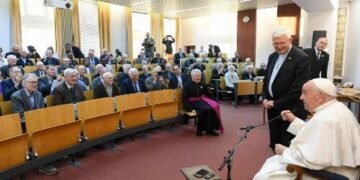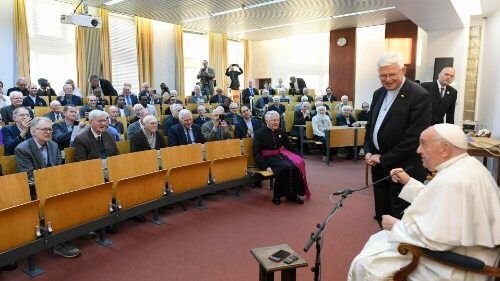By Charles Igwe
During his recent trip to Luxembourg and Belgium from September 26-29, Pope Francis emphasized the evolving role of women in the Church, a theme that also featured prominently in his private conversation with 150 Jesuits in Brussels. As is customary during his apostolic journeys, the Pope set aside time to meet with members of the Society of Jesus. This meeting, held at the Collège Saint-Michel, gathered Jesuits not only from Belgium but also from Luxembourg and the Netherlands. The discussion took place between his visit to the Université Catholique in Louvain and a surprise stop at the Brussels Expo Hall, where 6,000 young people had gathered for a vigil.
In the private setting, Pope Francis engaged in an open dialogue with the Jesuits, addressing a variety of topics including secularization, migration, inculturation, and the mission of the Society of Jesus in today’s world. The conversation also touched on pressing matters within the Church, such as the ongoing Synod. According to La Civiltà Cattolica, which later published the full transcript, the meeting was marked by its spontaneity and frankness. The session even began with a song accompanied by guitar, performed by Father Marc Desmet, the superior of the Jesuits in the Netherlands.
When asked by one of the Jesuits about the Church’s progress in providing women with a more just and appropriate place, Pope Francis responded with a profound reflection: “The Church is woman.” He noted that women are endowed with unique charisms, and that discussions about their role in the Church should not be confined to the question of ministry. The Pope stressed that the concepts of “masculinism” and “feminism” are often reduced to commercial or ideological debates, and that his focus is on making concrete changes within the Church structure.
Pope Francis highlighted the increasing responsibility women now hold within the Vatican. He pointed out the appointment of Sister Raffaella Petrini as Deputy Governor of the Vatican City Governorate and Sister Alessandra Smerilli as Deputy Secretary of the Dicastery for Integral Human Development. He also mentioned the groundbreaking inclusion of three women—Sisters Petrini, Yvonne Reungoat, and laywoman Maria Lia Zervino—on the team responsible for selecting bishops. “Since they are involved in selecting candidates, the process has improved significantly,” the Pope noted, praising their keen discernment.
In addition to these roles, Pope Francis cited Sister Simona Brambilla, the Secretary of the Dicastery for Consecrated Life, and Charlotte Kreuter-Kirchhoff, the Deputy Coordinator of the Council for the Economy, as further examples of women taking on key leadership roles. He reassured the Jesuits that these developments mark significant progress, saying, “Women are entering the Vatican in positions of high responsibility, and we will continue on this path. Things are functioning better than before.”
The Pope also shared a personal anecdote involving Ursula von der Leyen, the President of the European Commission. He recounted a conversation where he asked her how she managed certain complex issues. Her response—“The same way all of us mothers do”—left a deep impression on him, offering further reflection on the unique perspectives women bring to leadership roles.
Pope Francis’ remarks reflect his ongoing efforts to elevate the role of women within the Church’s leadership, an initiative that he has consistently pursued throughout his papacy. These changes, he affirmed, are not only significant but essential for the Church’s future.







































